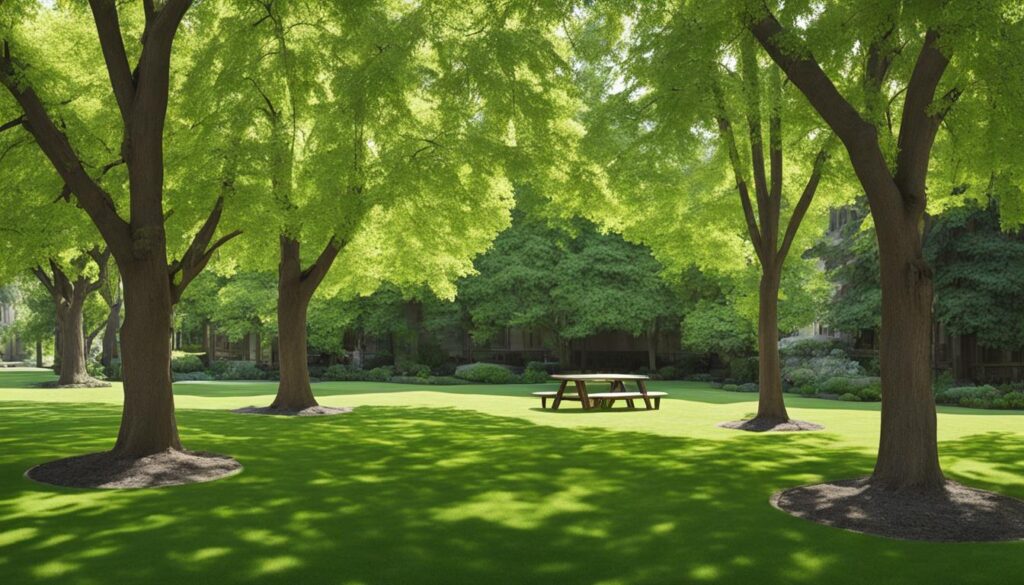If you’re looking to add trees to your yard but are concerned about the potential damage caused by invasive roots, consider planting trees with shallow root systems. These trees offer a range of benefits while minimizing the risk of harm to your home’s foundation and plumbing.
By opting for non-invasive tree roots, you can prevent soil erosion, provide shade and wind protection, attract wildlife, and even improve air quality. Planting these trees will allow you to enjoy the beauty and advantages of having trees in your yard without worrying about costly repairs or maintenance.
Some examples of trees with shallow roots include oaks, pines, maples, ashes, elms, and fruit trees. To ensure the best choices for your specific environment and needs, it’s always a good idea to consult with an arborist.
Types of Trees with Non-Invasive Roots
When choosing trees for your yard, it’s important to consider their root systems to avoid any potential issues with invasive roots. There are several types of trees with non-invasive root systems that are ideal for your landscaping needs.
Oaks: Oaks have deep taproots that anchor the tree, making them less likely to cause damage to your property. Their taproots help provide stability and are beneficial in preventing soil erosion.
Pines: Pines have shallow root systems that spread out wide. This characteristic makes them great for preventing soil erosion, as their roots hold the soil in place. Additionally, their shallow roots are generally non-invasive, making pines a suitable choice for most yards.
Maples: Maples, known for their vibrant fall foliage, have shallow root systems. While their roots may not cause immediate damage, they can pose a risk to underground pipes and foundations if not properly maintained.
Ashes: Ash trees have deep taproots, which make them resistant to high winds. Their taproots also aid in preventing soil erosion. If you’re looking for a tree that combines beauty and strength, ashes are a great option for your yard.
Elms: Elms have shallow root systems that require proper maintenance to prevent any potential damage. If well-cared for, elms can provide shade and enhance the landscape’s beauty. However, their shallow roots may cause issues if left unchecked.
Fruit trees: Fruit trees, such as apple, cherry, or pear trees, also have shallow root systems. While they offer the joy of homegrown fruit, it’s important to ensure their roots are properly pruned and maintained. This helps avoid any damage to foundations or underground pipes.
By selecting trees with non-invasive root systems, like oaks, pines, maples, ashes, elms, and fruit trees, you can enjoy the beauty and benefits of trees without the risk of invasive roots causing damage. Be sure to consult with an arborist to determine the best tree species for your yard and to ensure the long-term health and safety of your landscape.
Conclusion
In conclusion, planting shallow root trees is a wise choice to protect your home’s foundation and avoid the potential damage caused by invasive tree roots. By opting for non-invasive trees like oaks, pines, maples, ashes, elms, and fruit trees, you can enjoy the numerous benefits while keeping your property safe. These trees not only prevent soil erosion but also provide shade, wind protection, attract wildlife, and improve air quality.
To ensure that the trees you choose have non-invasive root systems, it is crucial to consult with an arborist. They have the expertise to guide you in selecting the right trees that are suitable for your yard. An arborist can assess factors such as soil conditions, available space, and potential risks, helping you make informed decisions to safeguard your home and landscape.
By taking the necessary steps to protect your home’s foundation and surrounding infrastructure, you can avoid costly repairs and enjoy the beauty of trees in your yard for years to come. So, before embarking on your tree-planting journey, consulting with an arborist should be a priority. Planting non-invasive trees is a responsible choice that balances your desire for greenery with the need to preserve your home’s structural integrity.
Can Shallow Root Trees Be Affected by Using Bleach to Kill Tree Roots?
Using bleach for killing tree roots can have detrimental effects on shallow root trees. The potent chemicals in bleach can seep into the soil, hampering nutrient absorption and moisture retention. Consequently, shallow root trees may suffer from stunted growth, leaf discoloration, and prolonged stress. It is essential to explore alternative methods that are safer and more tree-friendly when dealing with root-related issues.










